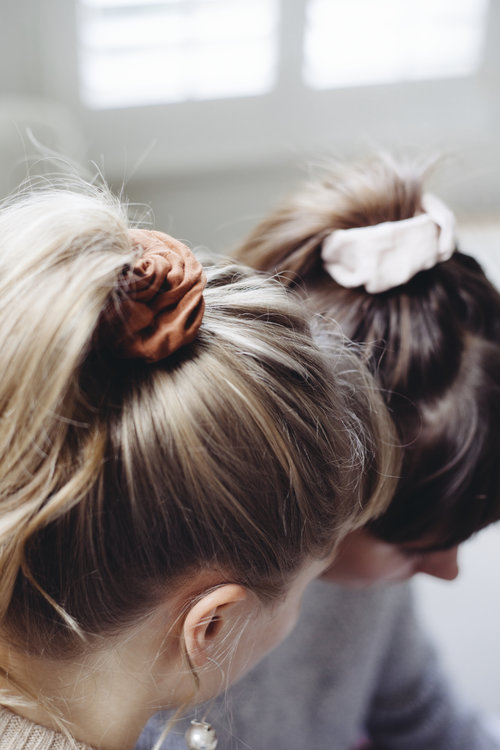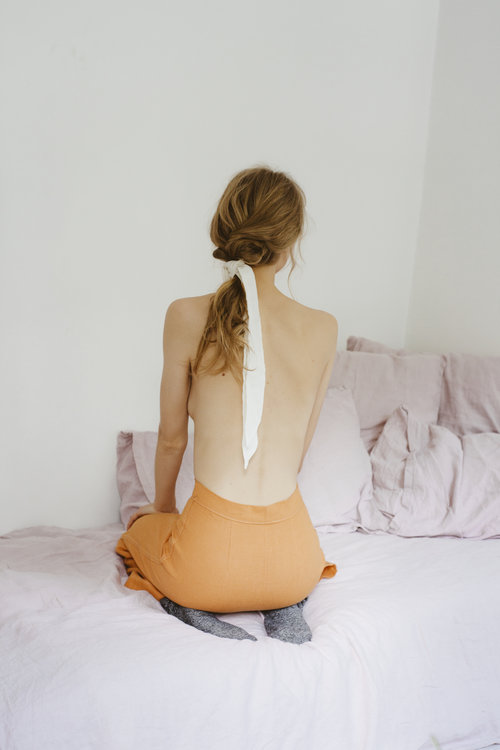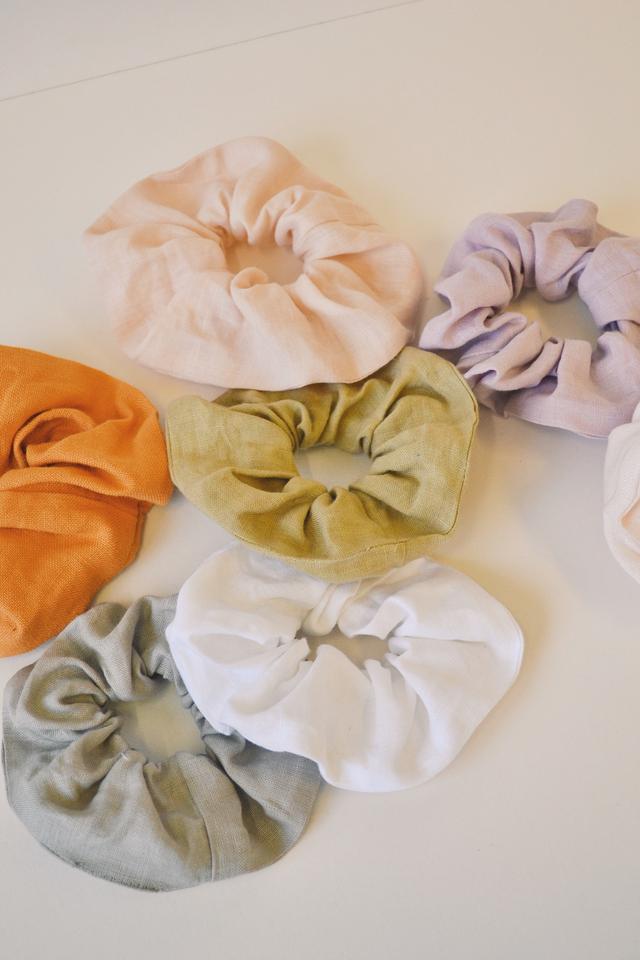LETTERS of ARA
An online journal & newsletter, exploring areas of influence & interest for Ara the altar.
Purposeful Packaging | Designed & Made In House
An introduction to Ara’s new packaging, designed & made in-house with minimal waste, using fabric woven in Lancashire.
For the first chapter of Ara the altar’s journey, the GOTS certified, organic cotton drawstring bags -which I had made specially in a carbon neutral factory as part of an ethical supply chain- have served me so well. For some time, however, in preparation for coming to the end of my supply, I have been looking for a way to further minimise Ara’s carbon footprint by bringing the production of my presentation packaging in house, in line with the slow approach I adopt in my jewellery design and production. The brief I gave myself was threefold:
1) Purposeful
To me, it feels counter intuitive to waste energy and resources creating packaging that would provide little value, use or longevity for my customers. Instead, I wanted to create a product that would be long-lasting and functional, in which to keep Ara pieces safe.
2) Low Impact
With respect for people and the planet integral to every aspect of the brand, it was of paramount importance to source a traceable, locally and ethically produced fabric, created from natural, sustainable materials. Furthermore, it was important to me that the design and methods used to produce the product itself would ensure minimal environmental impact and minimise waste, with a zero waste goal.
3) Reflective of the brand
Whilst first and foremost the packaging would have an intended purpose, I also wanted it to be something for Ara customers to treasure - not something mass produced but a slow-made keepsake to accompany their chosen piece.
After months of research, design and finding sewing pins everywhere, I am so pleased to share with you my new, slow-made, purposeful packaging that has been thoughtfully designed and created in-house; designed and developed by me and my partner, David, who has learnt to sew on a 1921 Singer to make these little pouches that will accompany every piece of Ara the altar adornment.
The Fabric
I began my search for a fabric that had been created with utmost respect for the earth. After some initial research I knew I wanted to work with hemp or linen, given their very little reliance on water or pesticides. It transpired that most of the hemp suitable for this project was made in China (which did not meet the requirements of my brief when concerning Ara’s carbon footprint). Whilst I did manage to source more locally made European hemp the fabric available to me at the time did not possess the qualities suitable for this particular project. I am, however, really keen to support the use of this fabric so keep an eye out for an exploration into hemp later down the line. In continuing my search for the perfect, earth-kind linen, I was delighted to find a very special fabric with UK based company, Bysshe, who source fully traceable, European yarns, and weave them into beautiful fabric, here in the UK. This small, independent company ensures “the highest quality at the lowest environmental cost, developing fabrics for a sustainable future”.
I fell for a beautifully tactile, twill cloth, woven on a Jacquard loom in Lancashire. The fabric is constructed of linen weft yarn, made from certified European Flax in France by a Masters of Linen certified company. The linen weft yarn is woven across GOTS (Global Organic Textile Standard) certified organic cotton warp yarns. The fabric was then finished in a specialist finishing mill up the road in Yorkshire. Finished without bleach treatment, this fabric celebrates the natural hues of the flax and organic cotton. On one side, the natural linen is more prominent -slightly flecked throughout, in warm, natural, earthy tones- and on the other side, the organic cotton twill is more prominent, appearing lighter due to its natural hue, and incredibly soft to the touch.
The Design
When it came to the design, our aim was to develop a pattern that would make the most effective use of the fabric with the least waste. We also had to consider the product’s intended purpose (to keep its cargo safe), and to ensure that the design would suit the thickness and properties of the fabric. Consequently, we chose to design a little pouch that would not rely on a drawstring closure (again to further minimise waste) and we developed a design based on a simple, repeatable rectangle to ensure minimal, if any, fabric waste.
Our unique design utilises a sewn down, fold-over top to keep belongings neatly tucked away inside. At first glance, it might not seem obvious how to easily open the bag. By folding the top flap inside-out, the full width of the opening is revealed, and the treasure can easily be tucked in or taken out.
The Production
It was important that the production of the bags reflected the production of the pieces: slow. For this project, my partner, David, learnt to sew on a very special Singer sewing machine from 1921, spotted and purchased in a charity shop by my grandad, and given to my mum many years ago. By managing the production of the bags in house, using GOTS certified natural organic cotton thread, and traditional production methods powered by 100% renewable energy, Ara the altar can continue to tread even more lightly whilst creating our earth-aware offerings.
I think these bags are really special and truly reflect Ara’s ethos. I am so pleased that one of these little pouches will accompany every piece of Ara the altar adornment.
Lauren
☾
Anti Waste Hair Accessories
Looking for a way to utilise the abundance of linen scraps from their production process, Bug Clothing, in collaboration with Glasshouse Salon, created a selection of timeless anti waste hair accessories.
Images by Sarah Victoria Bates for Bug x Glasshouse
I love to see thoughtful, independent businesses come together to create something considered, beautiful and purposeful, so I was over the moon to learn that Bug Clothing and Glasshouse Salon were combining their resources and skills to create a collection of dreamy anti-waste hair accessories.
Looking for a reason to use the abundance of linen scraps as a result of the production process in the Bug Hackney Wick studio, Bug worked together with Glasshouse to dream up and create a selection of three timeless accessories:
the classic scrunchie
a head wrap - perfect for the beach or days when you don’t want to wash or deal with your hair
a hair ribbon - for low pony-tails, low buns, or tying your hair up in a new way
Handmade by Bug founder, Amy Ward and her team, the scrunchie, head wrap and hair ribbon come in a beautiful range of linen colours and weights, available to purchase from both Bug Clothing and Glasshouse Shop.
When this collaboration launched last year I knew it was something I wanted to support. I love the idea of repurposing scraps that would otherwise become waste, together with knowing that the pieces are made from linen, a sustainable, natural material with little reliance on pesticides or water. I have fine, wavy hair that never sits quite right in a pony tail and I chose the hair ribbon in Cardamom. I love using it to tie my locks in a low knot or up in a high pony. It looks effortless and is an easy way to introduce a little pop of colour. I’ve still got my eye on a terracotta scrunchie..
Bug Clothing produce beautiful garments on a small scale using only natural fibres from deadstock designer factory waste. Bug make use of existing excess, rather than contributing to the production of new materials. Bug’s garments ‘reflect the ideology that we should all buy less and admire quality and consideration over quantity’ and they believe that ‘clothing should be comfortable and purposeful, without faulting on style, so we design garments that can be worn for years to come’. I love that Bug creates with longevity in mind, and I have fallen for their Earl jumpsuit.
Glasshouse Salon seek to make natural, organic and ethical hair and beauty more accessible. With a focus on long-term condition of hair, Glasshouse use only products that contain gentle, nourishing, natural ingredients. Their sister shop, Glasshouse Shop, combines the salon’s know-how with the Glasshouse aesthetic, offering unique, professional products that encompass all aspects of beauty - hair, skin and body. The shop takes care to approach hair and beauty needs with high regard to sustainability, considering every brand they stock from a sustainable and ethical perspective.
☾








